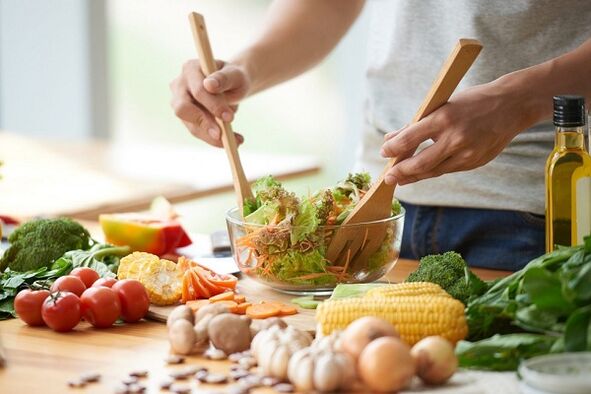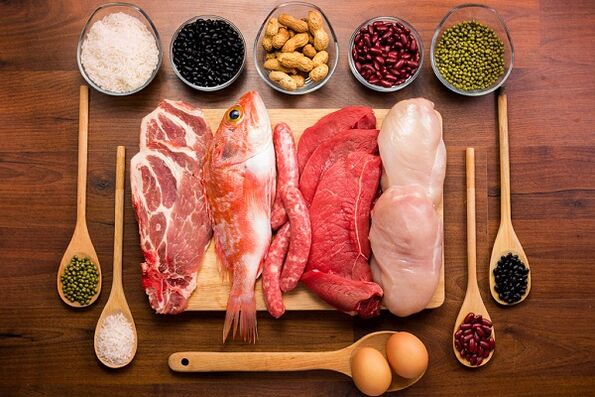Proper nutrition for various diseases is an important part of a speedy recovery. Diet for prostatitis and prostate adenoma improves the condition of the body, helps men to cope with a number of unpleasant symptoms. Mistakes in diet, on the other hand, can aggravate unpleasant symptoms and increase the anxiety caused by prostate diseases.
Nutritional features for prostatitis
The main effects of proper nutrition on prostatitis:
- prevents irritation of the pelvic organs and can exacerbate inflammation.
- Strengthen the functionality of the immune system.
- Normalization of the digestive tract.
- Decreased urination, especially at night.
- Prevent hardening of the prostate by restoring blood flow and nourishing the body.

Therapeutic diet includes:
- Enriching the diet with healthy products.
- Establish a drinking regimen (at least 2-2, 5 liters of filtered water per day).
- Combining "healthy" food intake with physical activity (eg, physical education).
- Development of separate menus for "exacerbation" and "remission" stages.
- Abstain from bad habits completely.
Useful products
Proper nutrition for prostatitis in men includes the use of foods that help speed healing. Detailed recommendations are given by a medical professional.
The following should be added to the diet:
- All kinds of nuts.
- Various dried fruits.
- Lean meat.
- Parsley and other fresh herbs.
- Red fish.
- Vegetables.
- Vegetable oils.
- Non-acidic fruits.
- Gray bread.
- Buckwheat / oat flour.
- Fermented boiled milk, kefir and cottage cheese.
- Fruit compotes.
- Honey.
- Fresh juices (especially asparagus).
- Parsnip.
When setting up a daily diet menu, you need to pay attention to the amount of fiber consumed. It is important for normal bowel movements (excretion of feces by the body from the digestive system). You should also eat foods rich in zinc. The trace element increases resistance to infection and improves sperm quality (as well as quantity).
In case of stable remission, the following are allowed:
- mushrooms.
- Spices.
- Some fried foods.
- Dry wine (100 ml 1-2 times a month).
Food Contraindications
When prostatitis is diagnosed, the following are prohibited for men:
- "Fatty" food - raises cholesterol levels, promotes the formation of plaque on the walls of blood vessels. Regular nutrition of "fat" leads to circulatory disorders and complicates the course of the disease.
- Alcohol (even beer) - generally has a negative effect on a man's blood flow and health. Causes obstruction in the small pelvis, reduces immunity, disrupts the production of hormones and prostate secretions, and impairs erectile function.
- Strong coffee - has a negative effect on the vascular system, increases the pressure in the prostate gland, helps to spread the infection (with a bacterial or viral inflammatory etiology).
The following products are also contraindicated:
- Fast food.
- Rich soups.
- By-products.
- Mushrooms.
- Hot peppers, garlic and onions.
- Acid.
- Spicy food.
- Smoking products.
- Fatty pork and lamb.
- Baking.
- Sour fruits.
- Foods with chemical additives.
- Carbonated drinks.
- Spices.
- Confectionery.
Diet for prostatitis in men: a weekly menu
Diet varies depending on the stage of prostatitis. For chronic prostatitis, the diet may be different. An example of a weekly menu for men in remission is presented in the table.
| Breakfast | Lunch | > // > | |
| Monday | cabbage and carrot salad; Oatmeal; Fruit juice. |
Vegetable soup; boiled beef with vegetable casserole; Some fruits. |
cottage cheese souffle; Fresh apple juice. |
| Tuesday | Cucumber and greens salad; Millet porridge; Cherry compote. |
Shrimp and vegetable soup; Steamed cutlet with mashed potatoes; Honey tea. |
Fritters; Aromatic berry salad with sour cream. |
| Wednesday | buckwheat; Cucumbers and tomatoes; Morse. |
Borscht in vegetable juice; Boiled breast; Garlic salad; Green tea. |
Carrot cake; Spoon sour cream; Kiss the fruit. |
| Thursday | Vinaigrette; Pumpkin seeds and dried apricot cake; Herbal decoction. |
Fresh cabbage soup; boiled rabbit with vegetable garnish; Sweet orange. |
steamed fish; Celery casserole; Apple compote. |
| Friday | milk soup; dried bread with cheese; Mint tea. |
Chicken soup; Beef with baked potatoes; Tomatoes. |
pancakes with berries; 2 tablespoons low-fat cottage cheese. |
| Saturday | Corn porridge with dried apricots; Soft egg; Fresh orange juice. |
Vegetable turkey soup; Steam meatballs; Dried fruit compote. |
Potato casserole; Lettuce leaves with olive oil. |
| market | baked potatoes; Salad with peeled pumpkin seeds; Herbal decoction. |
Cheese soup; steamed fish with buckwheat; Green or white tea. |
Vegetable cutlets; berry juice. |
Against the background of aggravation, nutrition should be light and gentle. Nutritionists recommend the following option:
- Breakfast. Buckwheat puree "smear", fruit jelly;
- Lunch. Cabbage soup, boiled fish, beet salad, tea without added sugar;
- Lunch. Steamed chicken meatballs with boiled vegetables and compote;
- For the night. A small portion of homemade yogurt.
The following menu will also work:
- Breakfast. Oatmeal with a little honey, cherry jelly;
- Lunch. Tomato liquid soup, light vegetable salad, a slice of whole grain bread with low-fat cheese, green tea;
- Lunch. Baked pumpkin with eggs, a slice of boiled fish, fresh;
- Before bed. Strawberry juice.
The following diet is suitable for antibiotic therapy:
- Morning. Curd casserole with berries, herbal tea;
- day. Carrot salad, chicken soup, boiled rabbit with vegetables;
- Evening. Baked vegetables, bananas and apples;
- For the night. A glass of yogurt.
How to eat right for BPH?
Benign prostatic hyperplasia (BPH) is expressed in the proliferation of body tissues. After confirming the diagnosis, the doctor prescribes a special diet in addition to medication. The diet for BPH is based on several principles:- no hunger with weight loss;
- In case of obesity, food is chosen to ensure weight loss;
- Foods with essential micronutrients and vitamins, various menus;
- Divide daily food intake into 4-5 meals;
- Avoid eating before bed.
The main focus is on products that help reduce benign tumors. Any food that increases the load on the bladder and (even indirectly) causes inflammatory processes is excluded.

Dietary disorders in BPH are common in men:
- Constipation or diarrhea.
- Bladder irritation.
- Increased risk of prostate secretion and blood stasis.
Sometimes men diagnosed with prostate adenoma switch to a sports diet, considering it the most balanced. It is important to understand that it is prepared for healthy people (and in addition to the main food) and is not intended for use in the presence of pathological processes in the body.
Nutrition Guidelines for BPH:
- Meals should be eaten at about the same time.
- Excessive eating sensations should be avoided.
- Diet is calculated separately for each man.
- The main focus is on foods that contain fiber and zinc.
- Elimination of food that adversely affects the immune system.
- Diet varies depending on whether you are on medication or surgery.
Foods that are good for BPH are included in the diet:
- Vegetable oils.
- Dietary meat.
- Cooked or raw vegetables and fruits. It is especially important to add cucumbers, pears, kiwis, potatoes, watermelons, bananas and dates to the diet.
- Fermented dairy products.
- Pomegranate, carrot, beet, cranberry and tomato juice.
- Mussels, fish, seaweed.
As with prostatitis, it is important to drink. You should drink about 2. 5 liters of water a day.
Experts advise to give up:
- Fast food.
- Processed and smoked cheeses.
- Milk.
- Keep juices and sugary drinks.
- Chili pepper.
- Garlic.
- Confectionery.
What do men's opinions say?
On the Internet, you can find comments from men about their experiences with prostatitis and BPH. In addition to information about medications, patients also share the results of the diet in their opinions.
“I have been suffering from prostatitis for more than 5 years. I haven't tried anything during this time. And I went to the doctors and self-medicated, it didn't make sense. I have noted for myself that while maintaining a healthy lifestyle (I'm talking about nutrition now), relapses are less common and they are not as "bright". The most important thing is to get rid of alcohol and, if possible, not to smoke and, as usual, to remove fried, salty and spicy foods. "
“Six months ago, I started having a terrible urinary problem. I went to the doctor and he said I had prostatitis. First of all, he told me that treatment and recovery depend on how I eat and how active I am. There were no signs of prostatitis. I am sure that the diet has contributed to the effectiveness of treatment. "
“Prostate adenoma ruptured unnoticed. The doctor said that surgery was not recommended at my age (I also have a heart problem). He prescribed medication, advised him to walk more in the fresh air and adjust his diet, wrote down what you can and cannot eat. Strictly banned the consumption of alcohol. I feel very good, erection even appeared. The mood has improved, I wanted to live with a new strength. "
























